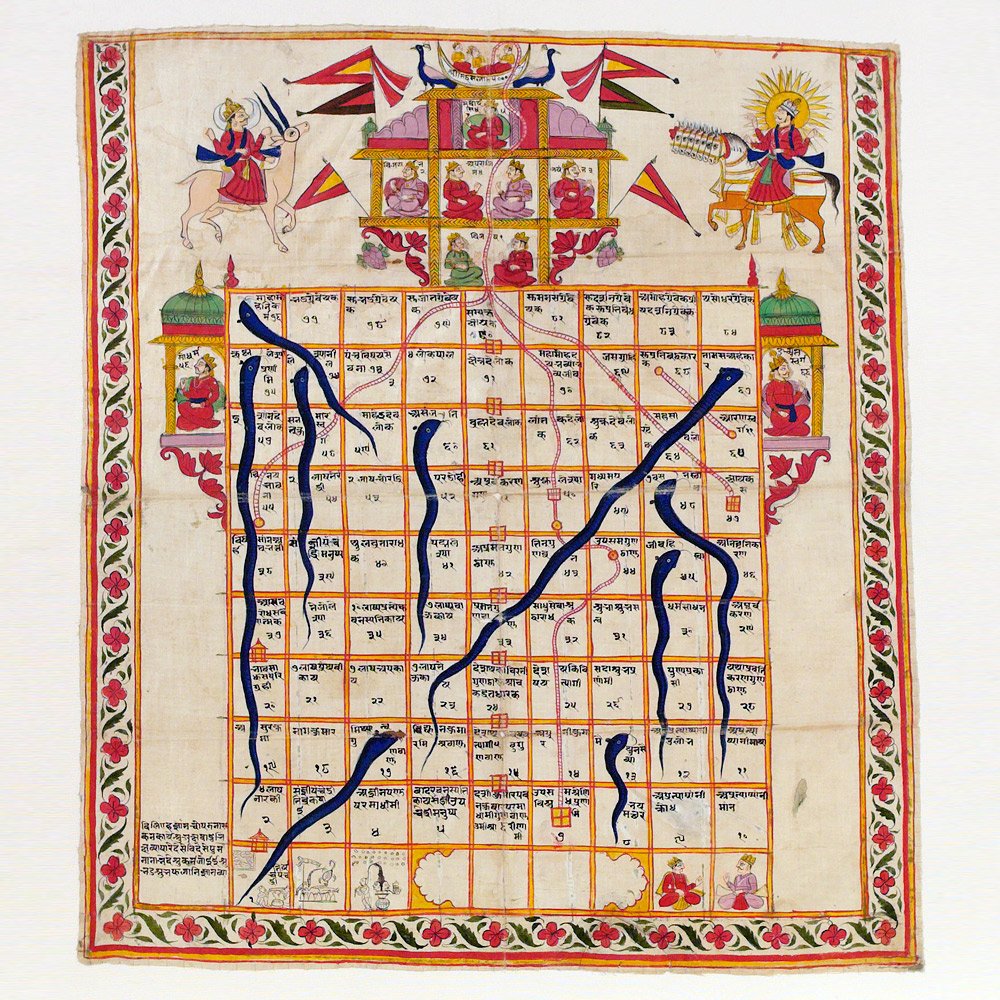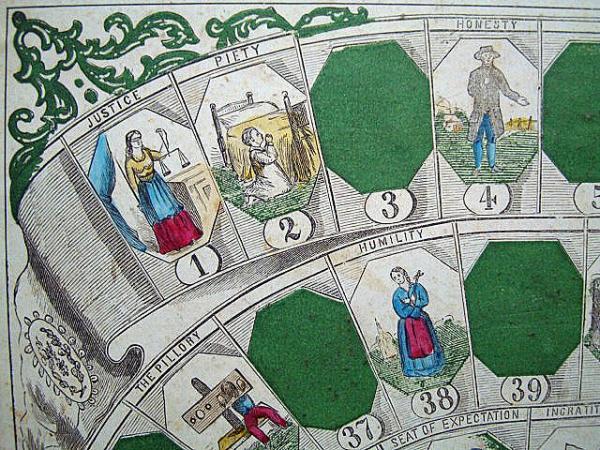Life is a game
The other day I came across one of those ubiquitous articles about the Problem with Men. And it had this line: 'life is not a race, it's not a game, and it's not a fight'. The problem, the author suggested, was men were attached to the wrong metaphor for life. He preferred 'life is a dance' - that frames life in a non-competitive and open way.
In the Quran, Allah likewise says: 'We didn't create the heavens and the earth, and all that is between, for mere play.'The Islamic apologist Hamza Andreas Tzortzis writes: 'believing life is just a game equals no ultimate purpose and value. Not only does it make life ludicrous but it also represents a very bleak outlook on our existence.'
ludicrous: early 17th century (in the sense ‘sportive, intended as a jest’): from Latin ludicrus (probably from ludicrum ‘stage play’)
So does treating life like a game necessarily empty it of meaning and moral value? It depends what game you're playing.
In the history of games, there have been games designed to teach people the hidden meaning of life, death and the afterlife, like Senet, an ancient Egyptian game where the movement of the pieces followed the soul's journey through the afterlife. In medieval India, a popular game was Gyan Chauper, in which players tried to move their pieces towards Moksha or ultimate liberation. Along the journey, the pieces could move up ladders - representing virtuous actions - or down snakes - representing vices. The soul could be one square away from liberation, only to tumble down a large snake - how often this seems to happen to spiritual gurus!
American Puritans developed a similar game in the 19th century called The Mansion of Happiness, in which players moved across squares representing the Christian virtues and vices until they reached heaven (shown on the left). However, in 1860 a new version of the game was developed, called The Chequered Game of Life, in which the object was not to get to heaven but rather to get rich, get a family, and retire in a nice home. That version - now called simply The Game of Life - is still played today. We edited heaven out of the game of life.
Today, we can create games that are so immersive, so huge, so brimming with intelligence, that we feel like we're in another world, a world of humans' own creation. That's what I felt when I played Grand Theft Auto for several days in a row - there were so many missions and side-missions, the world of the game was so changeable, so beautiful, so full of interesting characters, that I became totally absorbed in that world.
And when you can create games which are that absorbing and immersive, you can start to see this world as a game, a virtual reality. And that's precisely what's happened in the last few years - various philosophers and futurists have suggested we're actually living in a virtual simulation, created by future humans or some other intelligent species.
I've found myself thinking this more and more over the last couple of years, and I'm not sure if it's healthy or not.
I remember walking back over Hampstead Heath one evening last year, as the sun set. It was a beautiful evening, the sky was turning a sort of bruised purple, the darkening heath seemed to flicker with pagan mischief. And I thought, if this is a computer simulation, what an utterly beautiful simulation. The sky, particularly, is a masterstroke, but you can also drill down on tiny details - right down to the microscopic or even atomic level - and it's still beautifully and wondrously made. And then the characters you come across - so fascinating! So unpredictable! In fact, we've been playing this Earth game for 200,000 years and we still haven't exhausted all its missions, secret levels and hidden Easter eggs. Bravo to the makers, seriously. 9.5 / 10 on IGN.
I felt it again when I went to India last year. I hadn't been back-packing for two decades, and I was a little nervous. The first place I stayed was a beach in Goa called Patnem, where nothing much happened. I thought about walking to another beach one night, to watch some fireworks. My nerves told me not to go, that it might be dangerous (what a chicken), but I went anyway, and as I walked into Palolem, I imagined a digital voice saying 'New level unlocked: Palolem'. And I walked in wonder among the bongo-playing hippies and children throwing firecrackers, enjoying this new level.
I guess I was inspired by Westworld, which I'd been watching the month before. It's about a fake Wild West world filled with AI cowboys and Indians, who let the visiting tourists act out their wildest fantasies without legal consequences (it was Charles Dickens, in 1838, who first had the idea for a theme-park populated by robots so humans could act out their murderous appetites). In Westworld, tourists can either stay near the centre, where the action is pretty tame, or they can go on missions further out. 'The further out you venture, the more intense the experience gets'.
Is it unhealthy, this tendency to view life as a virtual reality game?
It could be. You can start to see everything and everyone as fake. This is what happened to me after I emerged from a 10-day ayahuasca retreat in October. Somehow or other, in the days afterwards, I became convinced I was in a fake reality, one that was shoddily constructed and filled with anomalies. I couldn't work out if it was a dream (why did it go on so long), or the afterlife (what a crappy afterlife) or if I'd been trapped in a fake reality by an evil shaman (I'd been watching a lot of Twin Peaks). How strange, to become really convinced that the reality you're in isn't real - is there a name for this delusion?
Something similar happened to Timothy Leary the first time he took LSD. He became lost in a reality where everything seemed fake and everyone seemed like plastic dolls. It was all just a rather shoddy cosmic play, which he had seen through. He wrote about it in The Psychedelic Experience, suggesting it was a phase people often go through on psychedelics:
We are little more than flickers on a multidimensional television screen…You feel ultimately tricked. A victim of the great television producer. The people are you are lifeless robots…You are a helpless marionette, a plastic doll in a plastic world. 'I am dead. I will never live and feel again'.
This is a sort of extreme dissociation from reality. It's what happens to people sometimes after trauma - their soul detaches from the horrific situation, because it's too painful to be there and feel it. It flies off and views it from above, as it were, as if through a safety glass. That's what happened to me when I had trauma in my late teens and early 20s, and I think the ayahuasca brought this traumatic dissociation back up, to give me the opportunity to process it and bring my soul back.
Luckily, the delusion wore off for me after five days or so, once I'd come back to the UK and surrounded myself with people I loved. But I still feel a sort of detachment and dissociation from life, that is, from the usual games people play in this life. I can't take them entirely seriously. I mean career games particularly, the sort of quest for ego-gratification that is totally absorbing in ones 20s and 30s. I can't take those games that seriously.
Sometimes this loss of interest in my previous games means this life seems a bit ludicrous, and I almost fall drawn to death. I don't mean in a suicidal or depressive way. I just think…death is where the mystery is. Between the levels. What is happening there? But sometimes this detachment and dissociation means I can calm down, take a breath, not get so absorbed in the trivial stuff, and just look around and enjoy the beauty and pathos of this game-world.
I can let go of fear and anxiety and craving - the fear of failure, the fear of ageing and sickness and suffering and death. It's just a game, and we have multiple lives. We can try out multiple ways of living, in fact, we already have. And if we wake up to the game, we can let go of some of the more boring and obvious missions - accrue a lot of money and glory - and get into some of the deeper and more interesting missions. How do we level up? Who is the programmer - is it us? Can we change the code?
I'll end with a quote from Ram Dass, Leary's former colleague, who often uses the 'life is a game / dream' metaphor:
If you know you’re dreaming, can you continue to dream? That’s what the soul does – the soul appreciates that it’s a dream and that it contains the ego. If you push away the ego, if you cultivate an aversion to that dream, you’re never going to be free because there will be an attachment. The process is realizing that you and I exist on more than one plane of awareness simultaneously and on one plane suffering stinks, and on another plane suffering is grace. The question is, “Can you balance those two things in your consciousness?”



